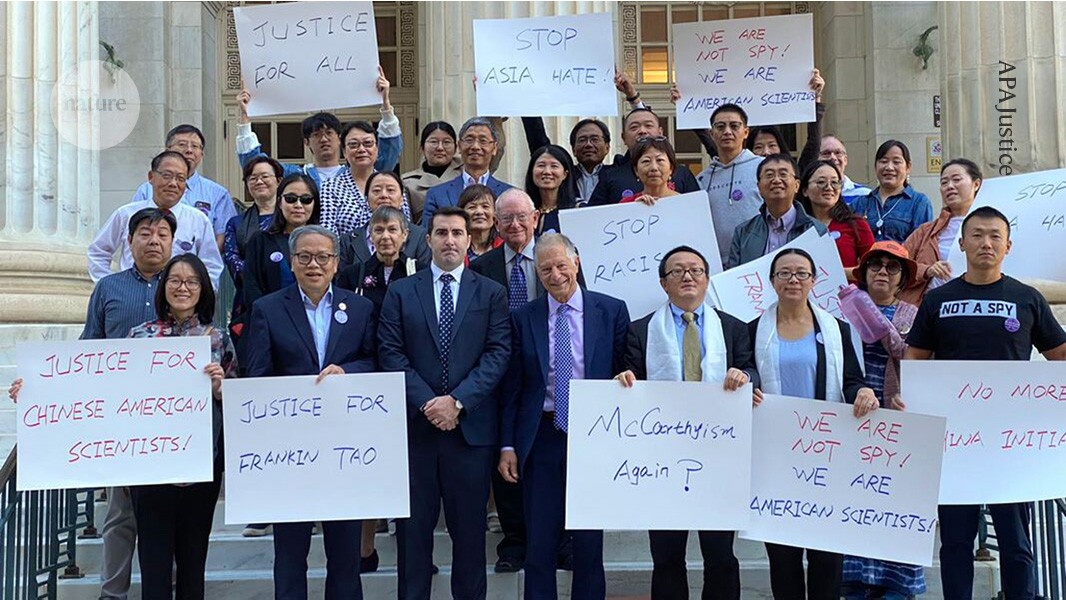US scientist falsely accused of hiding ties to China sues university that fired him

Feng ‘Franklin’ Tao says that the University of Kansas violated its own policies after he was wrongly arrested under the China Initiative

Supporters of the Asian American community outside an appeal hearing for chemical engineer Feng ‘Franklin’ Tao (bottom row, third from right) in Denver, Colorado, in September 2023.Credit: APA Justice
A chemical engineer arrested in 2019 under the controversial China Initiative, which aimed to protect US laboratories and businesses from espionage, is suing his former university. Feng ‘Franklin’ Tao was cleared of all charges and is demanding that the University of Kansas (KU) in Lawrence return him to his position as a tenured professor. The move comes as US researchers of Asian heritage wait anxiously to see whether Donald Trump, who took office for the second time as US president on 20 January, will revive the contentious initiative.
Tao, who was born in China, filed the lawsuit on 3 January, asking KU to pay his lost wages, his attorneys’ fees and damages for emotional distress and injury to his reputation. The document says that KU violated its policies on disciplinary procedures against faculty members, as well as a signed agreement he had with the university, by firing him before his case concluded — and by assisting federal investigators in bringing charges against him. “Rather than embracing academic rigor and enlightened, critical judgment, the university allowed itself to join in fear mongering and racist witch hunting,” the lawsuit says.
The US Department of Justice (DoJ) shut down the China Initiative in 2022 during Joe Biden’s presidency, owing to the perception that the initiative was racially biased. Officials, however, denied that any actions taken under its auspices were racially motivated.
Karen King, one of Tao’s attorneys at the firm Morvillo Abramowitz Grand Iason & Anello in New York City, said that Tao did not want to comment on the case “at this time”. KU did not respond to Nature’s requests for comment.
Insufficient evidence
Tao, the first academic to be charged under the initiative, was accused of defrauding KU by simultaneously working for Fuzhou University in China, a charge he denied. He was also accused of failing to disclose his contact with Fuzhou on a university conflict-of-interest form, and charged with failing to disclose his ties to China while receiving research funding from the US Department of Energy and the US National Science Foundation.
After a two-week trial in April 2022, a jury acquitted him of four of the eight charges, but found him guilty of four others — three for wire fraud and one for making a false statement. However, US district judge Julie Robinson reviewed the findings and overturned the wire-fraud convictions in September 2022. Tao appealed the conviction for the remaining charge, and in July last year, the 10th US Circuit Court of Appeals agreed with him and overturned it on a vote of 2–1. The court said that DoJ prosecutors had not provided sufficient evidence that Tao’s lack of disclosure to KU had any effect on government funding decisions.
Tao’s lawsuit says that the university dismissed him soon after the jury verdict in 2022, before he’d finished appealing the decision, and that it terminated his position in January 2023 without holding a hearing — even though university policy requires one.
Anita Levy, a senior programme officer in the department of academic freedom, tenure and governance at the American Association of University Professors (AAUP) in Washington DC, says that she was not involved with the Tao case, but that in general, the AAUP recommends that universities have procedures for dismissal that protect the rights of professors. This includes holding a hearing at which the faculty member can be represented by legal counsel.
“If the University of Kansas administration acted in disregard of academic due process as called for by the AAUP and dismissed Professor Tao prior to presenting him with charges and affording him an opportunity to be heard before a faculty committee, then it would appear he should be reinstated to his tenured position,” Levy says.
Enjoying our latest content?
Login or create an account to continue
- Access the most recent journalism from Nature's award-winning team
- Explore the latest features & opinion covering groundbreaking research
or
Sign in or create an accountdoi: https://doi.org/10.1038/d41586-025-00153-9
This story originally appeared on: Nature - Author:Neil Savage

















